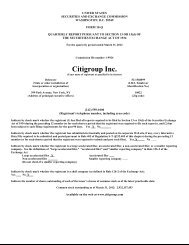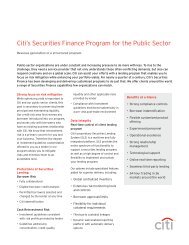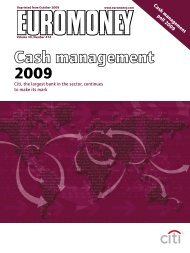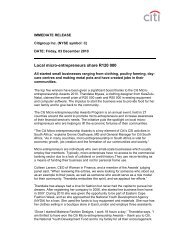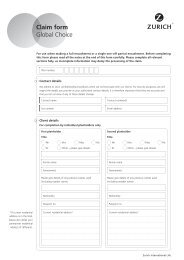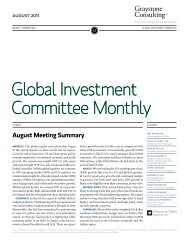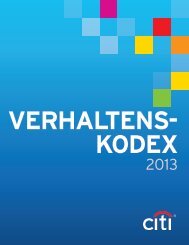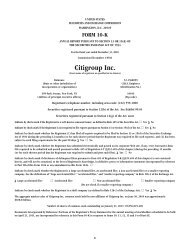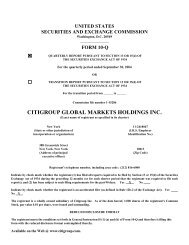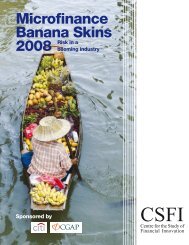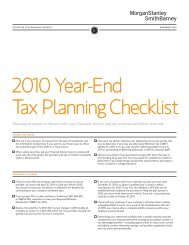FRANkLiN TEMPLETON INVESTMENT FUNDS - Citibank
FRANkLiN TEMPLETON INVESTMENT FUNDS - Citibank
FRANkLiN TEMPLETON INVESTMENT FUNDS - Citibank
Create successful ePaper yourself
Turn your PDF publications into a flip-book with our unique Google optimized e-Paper software.
PROSPECTUS OF FRANKLIN <strong>TEMPLETON</strong> <strong>INVESTMENT</strong> <strong>FUNDS</strong><br />
and brokerage, postage, telephone and facsimile. The Company may calculate administrative and<br />
other expenses of a regular or recurring nature on an estimated figure for yearly or other periods in<br />
advance, and may accrue the same in equal proportions over any such period.<br />
Foreign exchange hedging may be utilised for the benefit of Hedged Share Classes. As such, cost and related<br />
liabilities and/or benefits of such hedging activities shall be for the account of that class only. Accordingly,<br />
such costs and related liabilities and/or benefits will be reflected in the net asset value per Share for shares<br />
of any such Hedged Share Class. The currency exposures of the assets of the relevant Fund will not be<br />
allocated to separate classes. Foreign exchange hedging shall not be used for speculative purposes. The<br />
periodic reports of the Company will indicate how hedging transactions have been utilised.<br />
In determining the NAV, the Company values cash and receivables at their realisable amounts and records<br />
interests as accrued and dividends on the ex- dividend date. The Company generally utilises two independent<br />
pricing services to assist in determining a current market value for each security. If market quotations are<br />
readily available for portfolio securities quoted or dealt in on a stock exchange, the Company will value<br />
those securities at their latest available price on said stock exchange (last quoted sale price or official<br />
closing price of the day, respectively), or if there is no reported sale, within the range of the most recent<br />
bid and ask prices. Securities dealt in on an organised market will be valued in a manner as near as<br />
possible to that for quoted securities.<br />
The Company values over- the-counter portfolio securities acquired by a specific fund in accordance with the<br />
investment restrictions set forth in Appendix B above, within the range of the most recent bid and ask prices.<br />
If portfolio securities trade both in the over- the-counter market and on a stock exchange, the Fund values<br />
them according to the broadest and most representative market as determined by the Board of Directors.<br />
Generally, trading in corporate bonds, government securities or money market instruments is substantially<br />
completed each day at various times before the close of the New York Stock Exchange. The value of these<br />
securities used in computing the NAV is determined as of such times. Occasionnally, events affecting the<br />
values of these securities may occur between the times at which they are determined and the close of the<br />
New York Stock Exchange that will not be reflected in the computation of the NAV. The Company relies<br />
on third party pricing vendors to monitor for events materially affecting the value of these securities during<br />
this period. If an event occurs the third party vendors will provide revised values to the Company.<br />
The value of securities not quoted or dealt in on a stock exchange or an organised market and of securities<br />
which are so quoted or dealt in, but in respect of which no price quotation is available or the price quoted<br />
is not representative of the securities’ fair market value shall be determined by or under the direction of<br />
the Board of Directors.<br />
Since the Company may, in accordance with the investment restrictions set forth in Appendix B above,<br />
invest in securities that are restricted, unlisted, traded infrequently, thinly traded, or relatively illiquid,<br />
there is the possibility of a differential between the last available market prices for one or more of those<br />
securities and the latest indications of market values for those securities. The Company has procedures to<br />
determine the fair value of individual securities and other assets for which market prices are not readily<br />
available (such as certain restricted or unlisted securities and private placements) or which may not be<br />
reliably priced (such as in the case of trade suspensions or halts, price movement limits set by certain<br />
foreign markets, and thinly traded or illiquid securities). Some methods for valuing these securities may<br />
include: fundamental analysis (earnings multiple, etc.), matrix pricing, discounts from market prices of<br />
similar securities, or discounts applied due to the nature and duration of restrictions on the disposition of<br />
the securities.<br />
The application of fair value pricing procedures represents a good faith determination based upon specifically<br />
applied procedures. There can be no assurance that the Company could obtain the fair value assigned to<br />
a security if it were able to sell the security at approximately the time at which the Company determines<br />
its NAV per share.<br />
Trading in securities on foreign securities stock exchanges and over- the-counter markets, such as those in<br />
Europe and Asia, may be normally completed well before the New York Stock Exchange closing time on<br />
each day that the New York Stock Exchange is open. Trading in European or Far Eastern securities generally,<br />
86 Franklin Templeton Investment Funds



